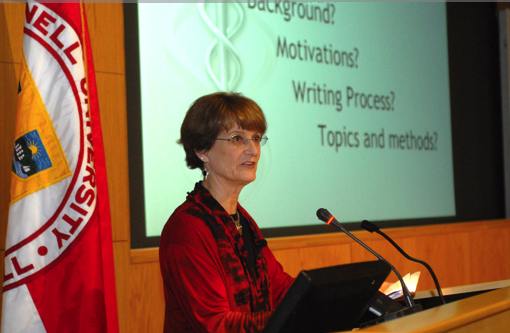April 2009

Katherine K. Gottschalk, PhD shed light on why doctors make time in
their breakneck schedules to write .
With sleepless nights, daily drama and enough paperwork to blot out every last ounce of free time, medical residencies define stress. Yet some doctors in this phase of training put aside time to write. To kick off this April’s Literary Lecture Series, Katherine, “Katy,” Gottschalk, senior lecturer in the department of English at Cornell University in Ithaca, New York, spoke to an audience at Weill Cornell Medical College in Qatar about three doctors known for their writing.
Using analysis, excerpts and her expertise, Gottschalk articulated the motivations of Drs. Perri Klass, Atul Gawande and Lewis Thomas. These doctors, she said, have shown profound interest in writing and have given it priority in their lives, yet their reasons diverge and they have each taken a unique approach.
At an early stage of her medical career, Dr. Klass saw the power of words and reflected on how she would handle them in her life, Gottschalk explained. Medical acronyms and phrases, while mostly useful, sometimes alienate doctors from patients—Klass notes that “OR” in place of “operating room” can speed up a conversation, but she stops to ask how “circling the drain,” as a casual reference to terminal illness, could possibly help a doctor connect with a patient who is dying.
Dr. Klass made a decision early on to “not carelessly absorb the logic that language brings with it,” Gottschalk explained. And she wrote about her reflections on this and profound experiences with patients, which she said she would have forgotten immediately, had she not seized the chance to write them down. Her work, Gottschalk said, shares insights and wisdom with those considering, or just starting out in, the medical field.
Gottschalk explained also that writing helped Dr. Klass preserve a certain level of naiveté throughout medical school and practice, which has helped her to maintain closer relationships with patients who aren’t fluent in medical terminology.
Readers of the New Yorker, Slate, The New York Times, the New England Journal of Medicine and other reputable publications have likely heard of Dr. Atul Gawande, an author discussed by Gottschalk for his contribution to a form of writing slightly different than that practiced by Klass. Dr. Gawande’s writing focuses more on the practice and politics of medicine than direct experience with patients, putting his work in the category of literary journalism, Gottschalk said.
In his contribution to the New Yorker and other publications, he has not only spent time writing articles but is also known to have gone through dozens of drafts with an editor to perfect an article.
Through his writing and his work, Gottschalk said, Dr. Gawande returns to the theme of improving medicine and working diligently toward the betterment of the practice. And when asked if writing adds to the weight of his workload, he said it actually lightens it.
“Writing let me step back and wonder about questions,” Gottschalk said quoting Dr. Gawande.
Throughout the lecture, Gottschalk visited the idea of writing as a chance to step back “to see the forest for the trees.” As a lively example of this, she presented Dr. Lewis Thomas as one of the most captivating of MD writers, a man who seemed to unwind from the profession into free-form writing escapades. The results of which engage and entertain with light and energetic reference to the interplay between structure and chaos. Although he participated fully in the medical field, he enjoyed getting away from what he called “the relentlessly flat style required for absolute unambiguity in every word” of science writing, Gottschalk said quoting him.
“Thomas squeezed writing into the corners of his life,” Gottschalk said, “he relished in being able to leap from thought to thought.”
Gottschalk read a segment of Dr. Thomas’ work entitled “Tuscon Zoo,” which showcased his writing skill as well as a genius sense of reflection—he noted a joyful moment in his life as he watched animals and recounted the tendencies of his mind as it both tried to define what was happening and resisted the definitions themselves.
Doctors who write have done so to find a private space and a freedom in their lives, Gottschalk said. By fitting writing into their already breakneck schedules, Gottschalk showed how they illuminate once-hidden facets of humanity and touch the lives of readers as well as their patients.
For more information on the April Literary Lecture Series, click here.
Report by Emily Alp
